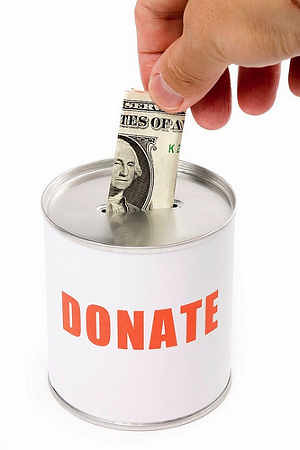The April Edition of Teaching Your Kids about Money
Part of learning to handle money in a responsible manner
is also learning how to be charitable and giving in nature. I would venture a guess that no parent wants
their child to become a miser and act like Ebenezer Scrooge, but parents may
worry that if they focus too much on financial concepts their child might become
overly fanatic about money. Striking a
balance between managing their own money and helping others is yet another skill
that takes practice.
As with many money management concepts, there are
differing opinions and methods. The key
is to find the approach or combination of approaches that works in your family
and that matches your family’s values. I
have seen two fundamental approaches to getting kids involved in charitable
giving.
 |
| from flickr.com |
Structured Income:
One idea is to have your child divide all of their income
into portions, such as a Save portion, a Spend portion and a Share portion. The amount of money that is placed into the Share
portion would be allocated for a charity donation. For example, if your child gets $5 per week
for allowance, you might split it into $2 for Savings, $2 for Spending and $1
for Sharing. If you child does not get
an allowance, you could also use a percentage method for the money that they
earn from extra jobs, such as 40% Savings, 40% Spending and 20% Sharing.
Model the Behavior:
Other parents want their children to independently choose
to be charitable instead of making them divide their income. They believe that to truly teach charitable
giving, kids need to want to give
their money as opposed to having to
donate. With this approach, the parents
model the desired behaviors and encourage their children to get involved. Examples would be involving the children in
deciding which charity to donate to or getting the family involved in
fundraising activities for a specific charity.
I think it is important to note that charitable giving
does not exclusively involve giving money.
Kids need to know that giving involves attitudes and service, not just
writing a check. When children see their
parents helping a neighbor, picking up trash or allowing someone to go in front
of them at the grocery store, they are witnessing kindness and a giving
attitude. I truly believe that if a
child sees this behavior on a regular basis, they will be more likely to adopt
this attitude themselves. Daily random
acts of kindness are the foundation for developing a giving attitude.
There are many types of service activities that kids and
families can get involved in. Kidsactivities.net
has a fabulous list of community service ideas that can involve kids and
families. Here are a few of their
thoughts:
- Plant produce and donate the harvest to a local food bank.
- Pick up litter at a park.
- Make treats for a local senior home or a fire/police department.
- Collect travel toiletries and donate to a local shelter.
- Make a gift basket for someone in need.
- Make a book on tape to contribute to a local daycare center or pediatric patients.
- Make bookmarks and leave them in a basket at your local library.
- Have a neighborhood book drive. Donate books to a local shelter or day care.
- Make fleece blankets for children’s hospitals.
- Offer to wash a neighbor’s dog or car!
- Collect items for care packages to be sent to the troops.
How do you develop charitable giving with your kids? Please share your ideas.









Years ago, I gave my younger cousin the book "Three Cups," which basically sets the stage for saving in the three categories you mention (spending, saving, sharing). It's such a wonderful idea - but hard for me to model myself, sometimes. Darn greed...
ReplyDeleteI am not familiar with that book. I'm going to have to look for it. I just love kids books!
DeleteThe kids from our church (from pre-schoolers thru high schoolers) have been involved in raising funds for charities, they have served food to the homeless, visited folk in nursing homes, wash cars for charity, cleaned parks in the community, helped repair homes for families in need. It really is about the opportunities adults give kids and the model they set.
ReplyDeleteLove your last sentence..."it really is about the opportunities adults give kids and the model they set." Very well said!
DeleteMy parents were always big on donating. They would make us collect our toys/clothes that we didnt use anymore and head out to salvation army or a homeless shelter.
ReplyDelete